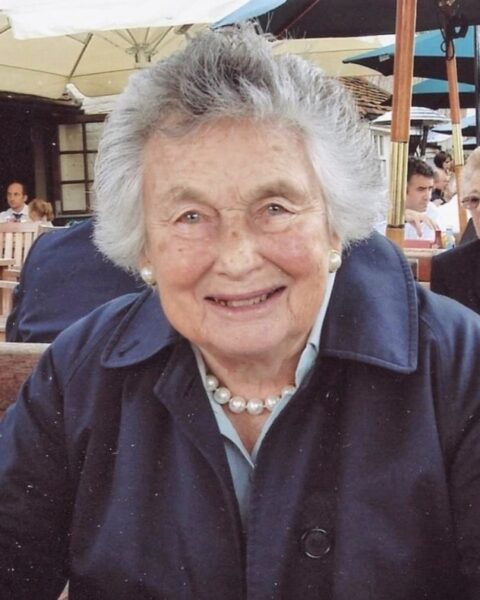
Suzanne Miers Oliver
Suzanne Miers Oliver, professor emerita of history at Ohio University, passed away at her home in Placida, Florida, on September 11, 2016, at the age of 93. Word of this great loss to the historical profession that she loved is only now reaching her many friends and colleagues.
Suzanne Miers Oliver (née Doyle) was born in the Belgian Congo (now the Democratic Republic of Congo) in 1922 to American parents and educated in Brussels and London. She was awarded a BA by the University of London in 1944 and an MA in 1949, the same year that she married Brigadier Richard Miers, with whom she had two children. She taught at the University of London in 1947–48 and the University of Malaya (Singapore) between 1955 and 1958. After Richard’s death in 1962, she took a PhD in African history at the University of London with Roland Oliver, the eminent founder of this then-new field of study, whom she subsequently married in 1990. He predeceased her in 2014.
Sue, as she was known to her many friends and colleagues, taught at the University of Wisconsin–Madison in 1967–68 and again in 1969–70 before joining the history department at Ohio University in 1970, where she remained until her retirement in 1990. At Ohio, she became an internationally known and respected leader in the study of global slavery and abolition. While Africa remained the principal focus of her scholarship, her dedication to deepening our knowledge and understanding of this fundamental problem in human history prompted her to pursue her interests as far afield as China.
Sue was the author of two major monographs, the first of which, Britain and the Ending of the Slave Trade (1975), encouraged interest in African and comparative slavery. Her second book, Slavery in the Twentieth Century: The Evolution of a Global Problem (2002), demonstrated that the history of abolitionism extends into contemporary global history. A series of co-edited collections—Slavery in Africa: Historical and Anthropological Perspectives (1977) with Igor Kopytoff, The End of Slavery in Africa (1988) with Richard Roberts, and Slavery and Colonial Rule in Africa (1998) with Martin A. Klein—established the ubiquity of slaves in the continent’s history and examined the contradictions between abolitionist pieties and practical accommodation during the decades of European colonial rule there.
Sue brought the scattered regional fields of our discipline together around an issue of global significance in Women in Chinese Patriarchy: Submission, Servitude and Escape (1994), co-edited with Maria Jaschok, and in several collections of diverse papers resulting from the series of conferences that Gwyn Campbell organized in Avignon: Women and Slavery (2 vols., 2007–08), Children in Slavery Through the Ages (2009), and Child Slaves in the Modern World (2011), all edited with Campbell and Joseph C. Miller. The extensive geographical and chronological range of these collections, with papers on Africa, the Americas, the Middle East, the Indian Ocean world, and Europe and the Viking north Atlantic, underscored not only the universality of slaving in human history but also the productivity of cross-regional exchanges setting this complex and problematic component of the human experience in its multifarious local historical contexts.
The international esteem in which Sue was held was made manifest in the 2002 conference in Avignon, when some 50 colleagues assembled in her honor. Many of these papers subsequently appeared in the two-volume Women and Slavery, published by Ohio University Press.
This accomplished and dedicated scholar leaves enlightened students and colleagues on every continent. Although saddened by her passing, those of us who knew Sue take solace from the fact that we had the good fortune, not to mention the honor, of having her presence grace our lives.
This work is licensed under a Creative Commons Attribution-NonCommercial-NoDerivatives 4.0 International License. Attribution must provide author name, article title, Perspectives on History, date of publication, and a link to this page. This license applies only to the article, not to text or images used here by permission.

